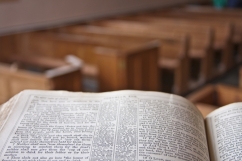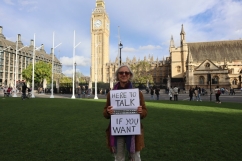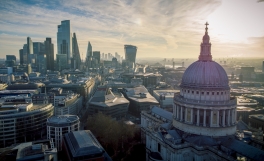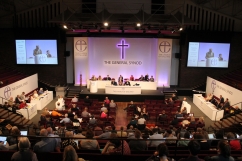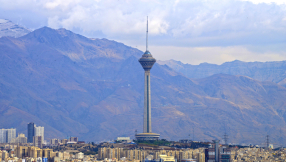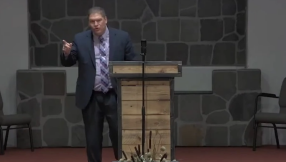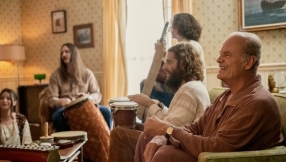
Citizenship is about the relationship between the people and the powers. It expresses our legal and cultural status. It defines our place in society. Yet, on a day-to-day level, most people rarely consider it – until there’s a problem. Then, when our place in society is challenged, it becomes of paramount importance, and we are reminded of how precarious our life is in this world.
Every Christian is a citizen of heaven – an ambassador of God here on earth, representing his ‘now, but not yet’ coming kingdom of Jesus. This citizenship is sovereign. Meaning that it takes precedence over any national citizenship. So, when we pray, “Let your kingdom come, on earth as it is in heaven,” we are in effect advocating for regime change. That’s pretty radical. And for two millennia it has struck fear into worldly leaders and generated huge friction.
Even so, despite these tensions, for the most part, Christian citizens have made extraordinary, indeed unparalleled contributions to society and to the nature of citizenship. Much of this can be attributed to the guidance that the Bible gives for engaging with the ‘earthly powers’, especially in passages such as Romans 13.
Here, Paul confirms: that the authorities have been instituted by God and should reflect God’s character; that power should be limited and is to restrain evil and promote the common good; that authorities can be corrupted by various idolatries; that Christian prayer, service, and leadership are important for good government (including participating in politics); that we should be model citizens; and that Christians can never give uncritical allegiance to any state, or government, since their first loyalty is to the Lord Jesus Christ.
Fair to say, this has been a winning formula. Over the centuries, the application and absorption of these principles has transformed Western culture and fostered a vast range of civic virtues and institutions – to the great benefit of Christians and non-Christians alike. The dual-citizenship tension between what Augustine saw as the ‘earthly city’ and the ‘heavenly city’ has never gone away. Nor should it. This is what it means to be salt and light, and to count the cost of following Jesus. A cost that is today especially pronounced in Muslim-majority countries such as Syria, Iran, Pakistan and Somalia, and in communist countries such as China and North Korea. Places, that I know from my time at Open Doors, where Christian citizens are brutally persecuted, and where their legal and cultural status is that of a hated minority (not that the fearful or extremist secular media care to cover such things).
Thankfully, here in the West, our civil liberties are more solid and secure. Or are they? Recently, the US Vice-President JD Vance gave a historic speech to European leaders in which he berated them for abandoning the values which give rise to Western culture. Listing a litany of human rights and civil liberties abuses by Western governments against their own citizens – and especially against Christian citizens – he cited the cancellation of a presidential election in Romania (of which the candidate has since been arrested), and the EU Commission agitating to shut down social media posts deemed “hateful”. Vance was particularly scathing of governments in Britian and Europe for urging citizens “to report any fellow citizens suspected guilty of thoughtcrime,” saying that, “Free speech, I fear, is in retreat.”
Identifying the UK prayer bans around abortion clinics as being particularly grievous, the Vice-president was roundly criticised by the mainstream media for suggesting that the Scottish government was planning to criminalise “even private prayer within their own homes.” However, as the recent statement by the author of the Scottish “buffer zones” law, MSP Gillian Mackay, confirms that the crime of praying within a home “depends on who’s passing the window”, it is clear that Vance was right. Identifying the ideological “threat from within” as the most serious existential for Western culture, Vance implored the gathered leaders to consider afresh the values which once defined their civilisation. A civilisation of unprecedented achievements that became the envy of the world. A civilisation built on values which are predominantly sourced from the Bible.
Today, the people of the book that built Western culture are now regarded by the secular ruling elites as second-class citizens – not WORIAD (Worthy Of Respect In A Democracy). Whereas once, Christians played a central and celebrated role in society, they are now undeniably on the periphery. As the writer Aaron Renn has noted, we have moved from being positively portrayed and treated, to having a neutral social status in which our views were tolerated or ignored, to being negatively portrayed and treated. Today, Christian citizens and their institutions are seen as impediments to progress (whatever that happens to mean at any given time). Indeed, they are deeply offensive to all those who seek to make their alternative lifestyle choices.
In my new book Seismos – Christian Citizenship in a Post-Christian West, I map how Christianity has been slowly but surely evicted from its central civic role to become (once again) a minority at the margins. Seismos is the word used in the Bible to describe the storm that the disciples encountered on the Sea of Galilee. A storm so great that everything was shaking. The book locates our times as times of shaking, so that what cannot be shaken may remain (Hebrews 12). It shows how secularism has brought about a regime change, and how the hope and expectations of Western citizens are withering. Although most of our fellow citizens continue to enjoy the fruits of Christianity, they neglect or even despise the roots of the fruits. They want the good stuff such as compassion, justice, trust, stability, security, equality and social cohesion. But not the God stuff, such as morality, accountability and self-sacrifice. However, you cannot have the former without the latter, at least not in the benign forms we have become accustomed to.
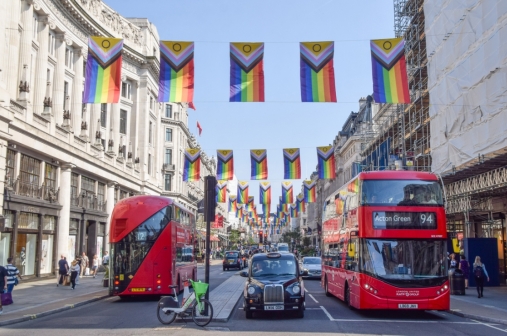
The former Chief Rabbi Lord Sacks described this grand shift as “Cultural Climate Change” – a wholesale rejection of Christianity in favour of, well anything except Christianity. And nature abhors a vacuum. In the spiritual and moral void brought by secularism, as citizenries are infected by intolerant ideologies and colonised by foreign ‘gods’, the social conditions described by Paul in Romans 1 are re-emerging. God and truth (which are synonymous) rejected, idolatry galore (think consumerism), folly celebrated (universities losing their faculties – literally), and marriage and monogamy eclipsed by promiscuity (via a corruption of sexual identity – with the definitions of gender and age now up for grabs).
It is a great irony that secularism is affecting a renewal of pagan beliefs and practices. After a long interruption by Christian civilisation, it seems that normal service is being resumed – but with one significant difference. While the culture that Paul describes in Romans 1 was pre-Christian, the one we see today is post-Christian. Which means that the new regime is not only particularly hostile to the old regime (us), it has also – as historian Tom Holland has well-chronicled – assumed much of our evangelistic zeal, albeit without any redemptive qualities or inclination.
Ergo, the ‘Great Awokening.’ Whereas, religion has excommunication and ecclesial authority, secularism has cancel culture, hate speech, and thought crimes. And all without the capacity of forgiveness or restitution – because, as I illustrate in Seismos through numerous examples, secularism is undeniably undemocratic, illiberal and authoritarian. Unable to tolerate other views and values, it is “totalising creed” that is hellbent on assimilating both individuals and institutions. Consequently, in this brave new world, to express or even hold biblical morals, or to posit a biblical anthropology (what it means to be human) is to be heretical, even criminal. This secular dominion – beyond which a Christian worldview is illegitimate – is perpetuated by leftist pietism, or what the writer Rod Dreher calls “soft totalitarianism”.
Consider the experience of Kristie Higgs, who lost her job in a school for privately expressing concerns about what was being taught; or Felix Ngole, who – for the same ‘thought crime’ – was expelled from his university course; or David Campanale, the Christian former BBC journalist prevented – because of his faith – from being selected to stand for parliament by his party. The list goes on, and like the treacherous Vichy France government during the Second World War, many secularised Christian leaders and institutions are happy to acquiesce to the demands of the new regime.
Consider the experiences of Rev Bernard Randall – sacked and prosecuted under terror laws for graciously suggesting that a biblical view of sexuality is of value; and Aaron Edwards, the theology lecturer sacked by his bible college and threatened with a counter-terrorism referral, for the same secular blasphemy. The complicity of Christian organisations in these persecutions (and that is what they are), and the ‘silence of the lambs’ or notable reluctance of Christian leaders to speak up is a prime example of what I identify as “submission to the new social orthodoxy or endorsement of moral inversion”.
Granted, some Christians have expressed outrage at what is happening, but nearly not enough, and often in ways that help the secular media to perpetuate handy stereotypes of Christians as obscure and angry moralists. Alongside rage and silent acquiescence (which is also complicity), another response of Christians to their newfound second-class citizenship has been denial – a refusal to acknowledge that the game has changed. In the US, it is leaders such as Andy Stanley, Preston Sprinkle, Matt Chandler, Russell Moore, David French, and Beth Moore who have taken every opportunity to downplay the scale and significance of what Os Guinness correctly identified at the recent Alliance for Responsible Citizenship (ARC) event as “Our civilisational moment”.
The truth is that business as usual is no longer an option, and for those who have the courage to face facts about our new civil status and who understand that ‘the only way out is through’ – meaning that we are in this cultural storm for the long run, decades and centuries – there is a double cause for hope.
First, Christians in the West now have opportunities to (once again) speak, act and live distinctively and even subversively. Secularism does not work. As its failures and contradictions become more apparent, and as its societal traumas increase, those who are grounded and confident in their faith, who have peace amid the storm, and who (accepting the cost of discipleship) refuse to yield on what is true and good, will be powerful and counter-cultural witnesses for Christ. To be sure, discrimination and vilification will come, and legal and cultural resistance will be necessary. But by living in the power and purity of the gospel – as a minority at the margins – normal Christianity is once again becoming a revolutionary movement.
Second, given the impracticalities of secularism and the zeal it cultivates for self and instant gratification, it lacks the capacity to play the long game. Culture is a big, messy and slow thing, and secularism is a distinctly self-absorbed and short-sighted ideology. Despite the myth of progress, it has no future. For those Christians with a more strategic vision, who can think and plan trans-generationally, there is a brighter future beyond this storm. By investing in church and public leadership to have a bigger vision and to pursue what Eugene Peterson called “a long obedience in the same direction”, Christians can certainly weather the seismos storm of Christian citizenship in a post-Christian West. By faith and fortitude, we can reach the distant shore.
Dr David Landrum is Executive Director of Biblical Leadership for Excellence in San Antonio, Texas. For more information on Seismos – Christian Citizenship in a Post- Christian visit www.theseismos.com










